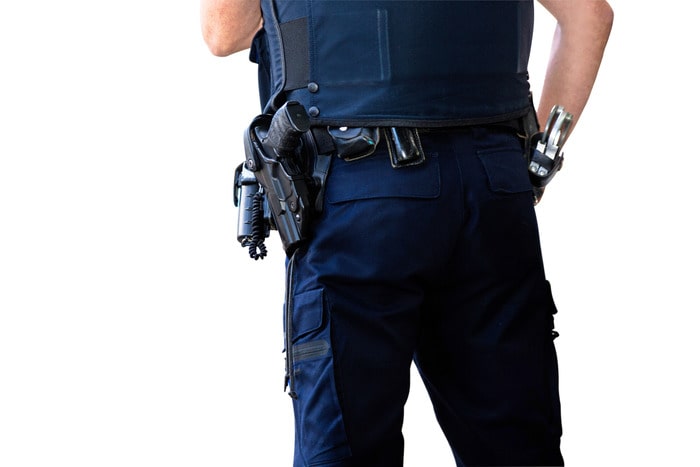
- August 16, 2023
- |security guard company
- | 0
- 2,219
Security Guards Carrying Firearms on Duty –
In the world of security, armed guards play a vital role in protecting people, property, and assets. However, with the privilege of carrying firearms comes a significant responsibility to adhere to strict legal requirements and regulations.
As a reputable armed security guard company, XPressGuards understands the importance of complying with these legal frameworks to ensure the safety of both guards and the public. This article delves into the legal requirements that armed security guards must adhere to when carrying firearms on duty.
1. Licensure and Training
State Regulations: Armed security guards must be aware of and follow the specific regulations set by their respective states. Each state has its own laws regarding armed security guard licensure, training, and permissible firearm usage.
Licensing: Armed security guards are required to obtain a valid license that permits them to carry firearms while on duty. This license is typically issued by a state regulatory agency or law enforcement authority.
Training: Armed security guards undergo rigorous training programs that cover firearm safety, proper usage, maintenance, and legal regulations. Training also includes conflict resolution, de-escalation techniques, and scenarios that prepare guards for real-world situations.
2. Background Checks and Eligibility
Background Screening: Armed security guards undergo thorough background checks to ensure they have no criminal history that might disqualify them from carrying firearms.
Mental Health Evaluation: In some states, armed security guards may be required to undergo a mental health evaluation to ensure they are mentally fit to carry firearms responsibly.
Eligibility Criteria: Guards must meet specific eligibility criteria, which may include age restrictions, citizenship status, and legal residency.
3. Firearm Possession Laws
Concealed Carry Permits: Armed security guards often need to possess concealed carry permits in addition to their security licenses. These permits allow them to carry concealed firearms while on duty.
Firearm Registration: In some states, armed guards are required to register their firearms with local law enforcement agencies.
Open Carry vs. Concealed Carry: Armed security guards must be familiar with whether they are allowed to openly carry firearms or if they are required to keep them concealed.
4. Use of Force Regulations
Use of Deadly Force: Armed security guards must adhere to strict regulations regarding the use of deadly force. Generally, they are only authorized to use their firearms in situations where their lives or the lives of others are at immediate risk.
De-Escalation Techniques: Guards are trained in de-escalation techniques and alternative methods of conflict resolution to minimize the need for using firearms.
Stand Your Ground Laws: In states with Stand Your Ground laws, armed security guards are allowed to use force, including deadly force, if they believe they are facing a threat that could result in serious injury or death.
5. Duty to Retreat Laws
Duty to Retreat: Some states have “duty to retreat” laws, which require individuals to attempt to escape or avoid a dangerous situation before using deadly force. Armed security guards must understand the laws in their state and how they apply to their role.
Castle Doctrine: In states with Castle Doctrine laws, individuals have the right to defend themselves within their homes or designated workplaces without a duty to retreat.
6. Reporting Requirements
Incident Reporting: Armed security guards are often required to report any incident involving the discharge of their firearm to their supervisor, law enforcement, and relevant regulatory agencies.
Use of Force Documentation: Guards must document any use of force, including the display or discharge of a firearm. This documentation is critical for legal compliance and internal reviews.
7. Liability and Insurance
Liability Coverage: Armed security guards and their employers often carry liability insurance to cover any potential legal and financial repercussions that may arise from the use of firearms.
Legal Protections: Some states have laws that provide legal protections to armed security guards when using deadly force in self-defense or to protect others.
The legal requirements for armed security guards to carry firearms on duty are complex and vary from state to state. Adhering to these requirements is crucial not only to ensure compliance with the law but also to prioritize the safety of guards, clients, and the general public.
As a trusted armed security guard company, XPressGuards places a high value on thorough training, adherence to regulations, and responsible firearm usage to maintain the highest standards of security and safety for all stakeholders involved. Contact us to learn more.


